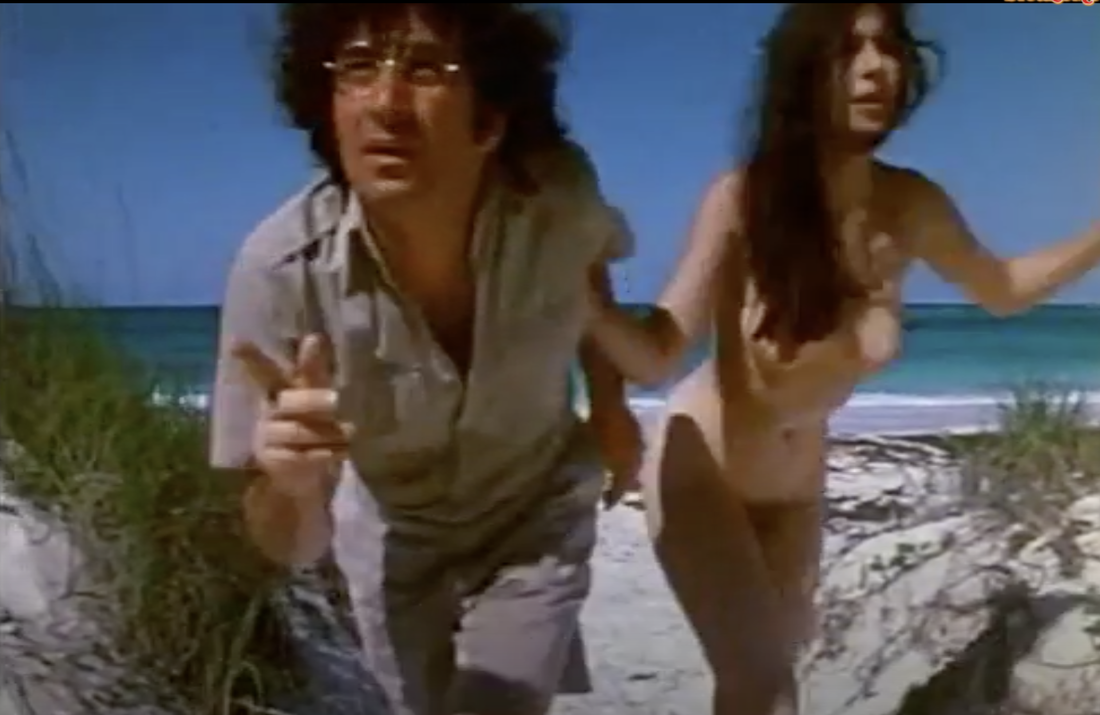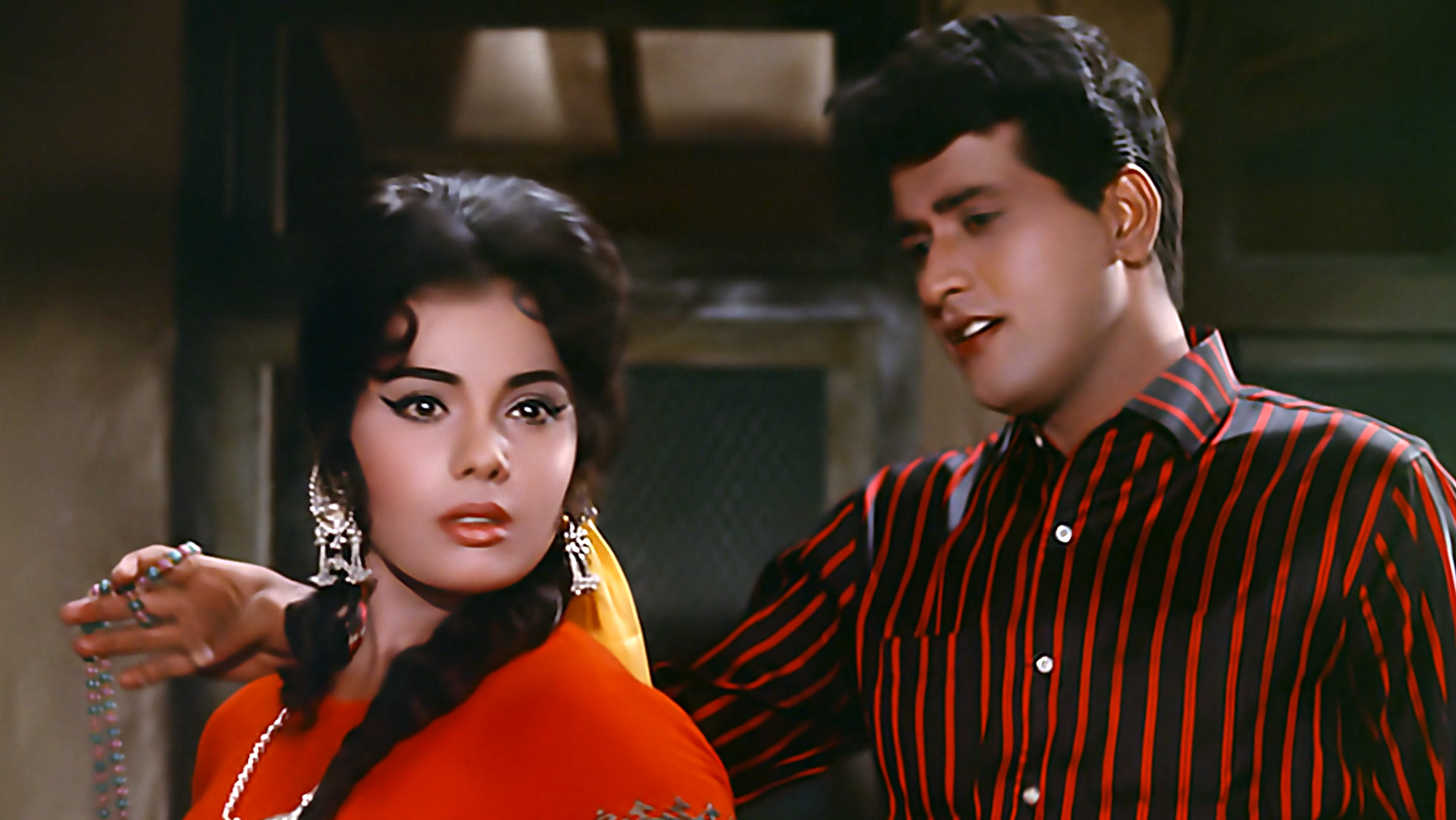
“For me, Mod Fuck Explosion was the culmination of the right amount of narrative and the right amount of sheer spectacle. Combine ‘em and you’ve got something that’s really interesting. Fun to watch, fun to follow, but not necessarily making sense all the time.”
No, you don’t. I mean, maybe, but not in this case. The quote is from self-styled punk filmmaker Jon Moritsugu. Apparently, he considers his 1994 film Mod Fuck Explosion the high mark of his career. His partner-in-film is his wife Amy Davis. This is what she had to say about the issue. “He keeps saying that every movie has to be as good as Mod Fuck Explosion and they’re not. (cracks up laughing) They’re not because Mod Fuck Explosion was innocent.”
I’m not sure I agree with either of them. Their films swing wildly between adolescent drivel and somewhat interesting adolescent drivel. There’s a good example of this combination in Mod Fuck Explosion, when Davis’ character, London, and a disaffected comic punker-girl named Nasty, have an exchange,
London: “Did you want to do it? I mean, did you want it?”
Nasty: “Pussy, cock, cunt, prick, it’s simple. What does free will have to do with fucking?”
It’s sort of equal parts stupid and interesting.
Mod Fuck Explosion is an angry, disjointed reworking of West Side Story, with the Jets and the Sharks replaced by motorcycle gangs. The ethnicity of the Sharks is changed from Puerto Rican to “oriental". The country of origin is changed, but the sense of “otherness” is maintained. Moritsugu is of Asian descent and he often incorporates issues about race in his films. The original West Side Story dealt with the racism of 1950s Brooklyn. Mod Fuck Explosion transposes the commentary to 1994, but it doesn’t fully engage the issue. Racism is just another bit of societal baggage Moritsugu and Davis kick around for 107 minutes.

The movie stumbles from scene to scene, not sure where it is going. At one point, London wanders into a threatening-looking art exhibit, and as she walks through it in the half-darkness, she recites a list, “These are the things I worry about: exams, fucking things up, terminal cancer, getting kicked out of school, not knowing how to fuck, not having ever fucked, getting fucked, going nowhere, being no one, getting fat, getting lost in this city, not knowing if I’m going crazy, my hair, my family going crazy, getting arrested, jail, being too normal, having to get a real job.” The list serves to sum up the themes in most of Moritsugu’s work.
Moritsugu claims to be influenced by “the nihilism of Jean-Luc Godard and Guy Debord.” I suppose I can see that, but it’s a bit lofty for a film that is closer to Pink Flamingos than Contempt. To be fair, I could see claiming that Pink Flamingos was influenced by Godard and Debord, but I would give Waters a lot more credit than Moritsugu. Waters had a well-developed understanding of how to incorporate the angry, obscene counter-culture impulse with something artful and intelligent. If Moritsugu is The Sex Pistols, then Waters is The Velvet Underground.

Part of why I disagree with Moritsugu’s assessment of his career is that I don’t see Mod Fuck Explosion as necessarily Moritsugu and Davis’ best work. A year before Mod Fuck Explosion, Moritsugu and Davis made Terminal America. It’s not a great film, but in many ways, it has more to offer than Mod Fuck Explosion. Moritsugu describes Mod Fuck Explosion as an example of a “lo-fi” film. It's shot on 16mm and shows little regard for lightning or craft in general. It’s part of an aesthetic that can fail or succeed just like any other. It doesn’t make or break Mod Fuck Explosion, but Terminal America has a different aesthetic. It uses an oversaturated, comic book pastiche look. It’s more garish than beautiful, but it’s bold and eye-catching.

Where Mod Fuck Explosion takes place in the gritty streets of a nameless city, Terminal America takes place in the saccharine world of suburbia. I’m guessing that when they chose to make Terminal America, Moritsugu and Davis took a break from watching John Waters films and switched to David Lynch, specifically Blue Velvet. In some ways, you could see Terminal America as an absurd parody of Blue Velvet. Instead of peeling back the carefully manicured facade of suburban America to reveal a surreal and terrifying underbelly, Moritsugu and Davis stumble around a hyper-stylized and absurd version of suburban America and then peel back its facade to reveal an equally absurd underbelly.
The film manages some funny moments. There’s a lot of grotesque stuff, like when a slimy lawyer convinces a sweet cheerleader to pretend her mouth is a pencil sharpener and his penis is a pencil. As in Mod Fuck Explosion, there is a good amount of commentary on how Asians are stereotyped. We begin with Moritsugu himself practicing a frantic parody of karate in his bedroom, only to immediately get beaten up by a skinhead in the parking lot.
Moritsugu made the film with money he won in a film competition. He described the production as "the most disgusting, worst way to make a movie, with that much money and that many people around.” Terminal America does not in any way live up to this claim. Watch five minutes of Meatball Machine or Blood Feast and you’ll know what I mean.
Moritsugu seems to think that sex, drugs, and rock ’n’ roll are the ultimate transgressions, but they are bourgeois transgressions that barely scratch the surface of truly perverse behaviors. The climactic scene in Lars von Trier’s Antichrist will knock you on your ass and leave a deep, nasty scar. Moritsugu’s work ’tis but a flesh wound.

In 2013, Moritsugu and Davis made Pig Death Machine. It’s a kind of science fiction horror thing. Davis plays a nameless woman who eats some tainted pork and gets violently ill. Despite the illness, she gets addicted to it and finds herself rooting through people's garbage in search of rotten meats. Her new diet keeps increasing her IQ, which we see flashing as a number on the screen.
There are a lot of close-ups of meat and flies, punctuated by sudden bursts of grungy music. There are also quite a few double exposures with high-school-education-style cartoons of cells and parasites. It’s an ugly film shot on video, which accentuates the garish, over-saturated colors and contrast lighting.
I have to admit, I just finished watching the film an hour ago, and I’ve already forgotten most of it. It was an hour and a half, but it could have easily been edited down to 45 minutes.
There really isn’t much more than the premise. In its favor, the film did feature a very enjoyable stop-motion sequence featuring clay figures, glitter, and a lot of raw meat. I would have happily watched an hour and a half of that. There is a second character who also partakes of the spoiled pork and gains the power to hear and understand plants. She hears a head of iceberg lettuce scream when she tries to cut it.
I guess it’s all an attempt at making an absurdist satire, but it doesn’t always work. Successful use of the absurd creates something shocking and bizarre that resonates with reality, despite it being ridiculous. Moritsugu and Davis manage to eke out a few of these moments in Pig Death Machine,but mostly it falls flat.
The trailer for the movie quotes The Wall Street Journal as saying, “Overflowing with eyeball-popping production design, eardrum-destroying rock ‘n’ roll, gross-outs aplenty and deadpan one-liners you’ll be quoting for weeks.” I highly doubt that the review is real, but regardless, the film does not deliver on any of those promises, except for the “eardrum-destroying rock ‘n’ roll.” It’s not the music, it’s the overall sound design. Moritsugu must have thought that drastic jumps in volume placed almost randomly throughout the film would do something other than completely annoy his audience. I’m not sure what he was after. There are a myriad of moments where the sound suddenly blasts so loud, it flies into overdriven distortion, leaving you with your face all scrunched up as if someone just barfed on you. Roger Ebert walked out after 7 minutes of one of Moritsugu’s films.

Moritsugu and Davis made seven films. The first full-length feature was My Degeneration. My Degeneration came out in 1990, which would make Davis 8 years old when she starred in the film as a drummer. Someone must have gotten their dates wrong somewhere. Anyway, stylistically, My Degeneration makes the most sense out of all the films. It is the lowest of the lo-fi films. It’s often barely visible. It’s enthusiastically bad and enthusiasm counts for a lot. Even if you’re gonna be shitty and stupid, you still have to sell it, you have to invest in it.
As in Beyond The Valley of The Dolls, My Degeneration follows the weird rise of an all-girl band. They’re called Bunny Love, and they play loud, messy punk music. There is some kind of deal-with-the-devil type thing where a skinned deer head decides to grant them fame and fortune. They are suddenly discovered by The American Meat Institute,and refashioned into a band named Fetish that promotes beef. One of the girls is secretly in love with a severed pig's head that she talks with privately. “So you’re pink and I’m white, so what? We love each other and that’s what counts.”
The film unapologetically slams unrelated ideas together and leaves you to figure out what it means. It mixes meat, fame, and capitalism into a blurry, barely visible montage reminiscent of a cable-access television show. Of all the films I have seen made by this bombastic duo, I think My Degeneration is the most internally consistent in tone and approach.
There is a scene where Amy stares into the camera with exasperation and complains, “I’m really tired and I gotta take a leak right now. Fuckin’ wanna go home. I mean, I’ve been out here for like 15, 20 minutes talking about this stupid shit. Fuck you man, fuck off. OK, are we done? Turn it off.” It’s not clear if she is in or out of character, but it doesn’t really matter.
The band goes through a training/grooming process to transform them into salable stars. They are taught to chant “consume, sell, commodify, kill.” Their manager explains, “Flower Power is dumb, dull, for losers, leads to the ontological void. Meat Power is smart, exciting for opportunists, and self-actualization.”

I managed to watch 4 out of the 7 Moritsugu movies. It’s hard to find them. I really would have liked to have seen his film Hippy Porn. The trailer makes it look pretty crazy. I was able to find plenty of hippy porn, but Moritsugu’s 1991 film Hippy Porn proved too elusive.
I prefer the earliest of Moritsugu and Davis’ films My Degeneration and Terminal America. Moritsugu is best known for Mod Fuck Explosion. Both he and Davis are musicians, as well. They play together in a lo-fi band called Low on High.
Despite their disheveled appearance, his films have made the rounds of all the big festivals and museums. Lots of industry people sing his praises. James Schamus, former CEO of Focus Features, once said, "Jon is a true cinema original. I'd rather be spit on by Jon than kissed by 95 percent of the directors out there."




